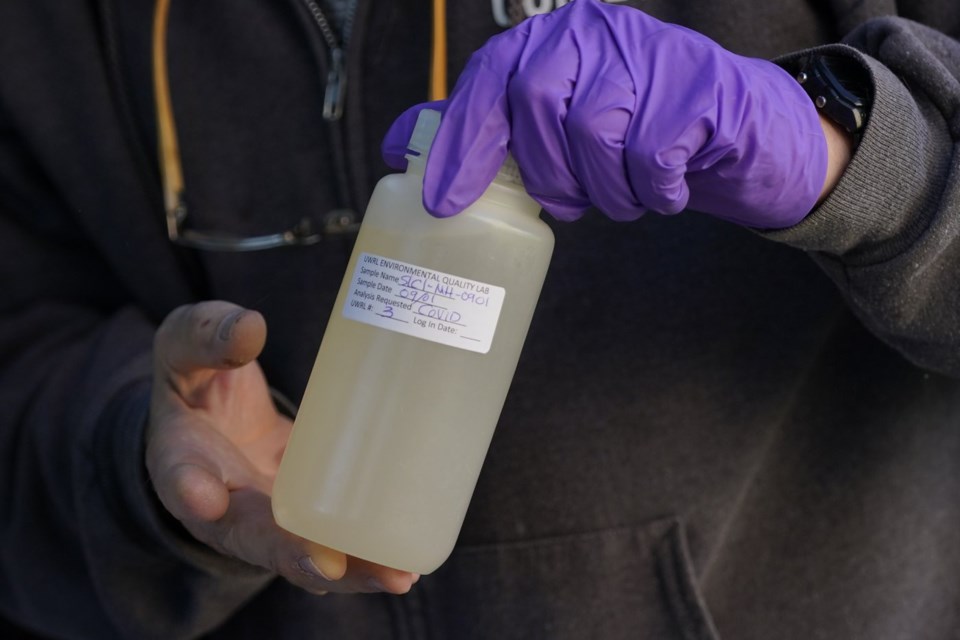Ontario is officially ending its COVID-19 wastewater surveillance program as of Wednesday in a move some public health experts say is shortsighted.
Dr. Fahad Razak, the former scientific director of the COVID-19 Ontario Science Table, called the province's decision "incredibly disappointing."
Wastewater testing gives an early indication of when COVID-19 and other viruses are on the rise, Razak said in an interview.
The wastewater surveillance in dozens of communities across Ontario was useful not only for detecting COVID, but for monitoring potential threats, including the possible arrival of H5N1 avian flu, he said.
Ontario's environment ministry said in an email on Tuesday it was "winding down" its program as the Public Health Agency of Canada expands its wastewater surveillance sites in the province.
But a spokesperson for the Public Health Agency of Canada said it only plans to test in four Ontario cities in addition to its four existing sites in Toronto, which won't duplicate the provincial program.
"The scope of the expansion would not replace the current scope of the Ontario program," Anna Maddison said in an email Tuesday evening.
"Ontario’s decision to not continue their wastewater testing program was not co-ordinated with PHAC’s decision to expand its wastewater monitoring program."
The additional federal wastewater surveillance is expected to begin before flu season this fall, Maddison said.
The provincial government "will work with the federal government and propose sampling sites that provide quality data for public health across the province," said Alex Catherwood, press secretary for the Ontario minister of the Environment, Conservation and Parks, in the emailed statement.
Ontario Health Minister Sylvia Jones defended the province's decision to drop the program.
"We have returned to what has been in place in Ontario for decades and that is a federal government that assesses the wastewater and works with our public health units and with our clinicians to make sure that as that information comes in, it is disseminated to public health units across Ontario," Jones said Wednesday.
"We had an increase during the height of the pandemic because of the need for additional COVID wastewater testing and we are returning to what I would call a normal state of affairs," she added.
Razak, who is an epidemiologist and internal medicine specialist at St. Michael's Hospital in Toronto, said many communities now won't have the virus monitoring they need.
”(Wastewater surveillance) provides information fast enough for you to act. So knowing that you have lots of COVID cases in hospital, that's too late to act in many ways," he said.
"We now know that the signal from wastewater — not just for COVID, but for example for RSV — it provides an early warning system when the disease is emerging, which gives enough time for individuals to change their decision-making or (for) public health units or officials to react."
The wastewater testing sites covered nearly three-quarters of Ontario's population in 2023, Razak said, and also included some targeted monitoring of COVID-19 levels in high-risk places such as long-term care homes or homeless shelters.
"To me this is a significant equity issue," he said. "This is moving in exactly the opposite direction of what we want in the best of public health programs."
Dr. Andrew Pinto, a family physician and public health specialist at St. Michael's Hospital, agreed that removing the provincial wastewater testing program is "concerning."
"We are really seeing the scaling back of investments in pandemic preparation," Pinto said.
"The question I think we should all ... really ask ourselves is ‘if there was a new threat that emerged say in October or this fall, would we be ready for it? And what have we scaled back and would have to reintroduce that we've lost?'"
The doctors' concerns were echoed by Ontario NDP Leader Marit Stiles, who said her party has "repeatedly" called on Premier Doug Ford's government to reverse its decision.
"We all went through a tough time facing COVID-19 and dealing with the impacts of a pandemic and a lockdown. Reliable wastewater testing is one of the tools we have at our disposal to monitor and prepare for future public health emergencies — why would we take that away?" Stiles said in a statement Wednesday..
"Has Ford learned nothing from the past few years? This program needs to be expanded, not ended.”
—With files from Liam Casey at Queen's Park in Toronto.
This report by The Canadian Press was first published July 31, 2024.
Canadian Press health coverage receives support through a partnership with the Canadian Medical Association. CP is solely responsible for this content.
Nicole Ireland, The Canadian Press




